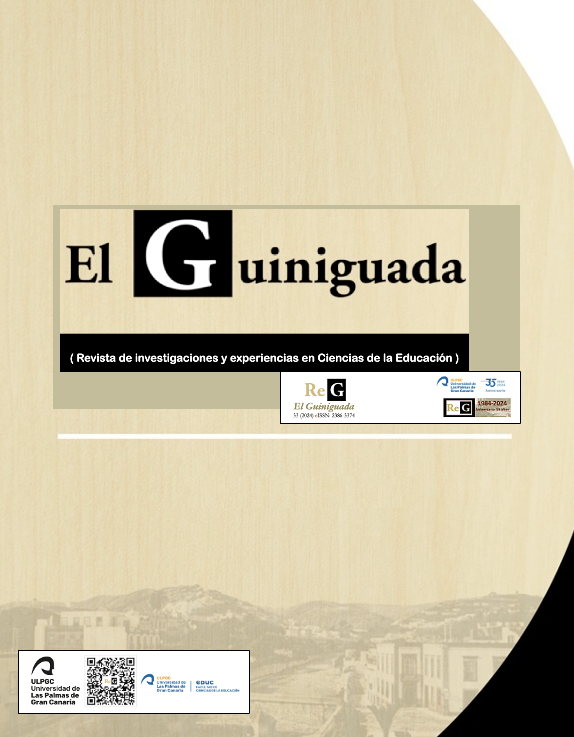Attitude and assertiveness in the classroom in the use of spoken Catalan. Actitud y asertividad en el aula en el uso de la lengua catalana oral
10.20420/ElGuiniguada.2024.727
Palabras clave:
Actitud lingüística, Asertividad, Educación Primaria, lengua catalana, prácticas escolaresResumen
Analizar la actitud y la asertividad en el uso del catalán oral que muestran en el aula 44 alumnos del grado de Educación Primaria de la UB y de la URV durante las prácticas de 2021-2022, en 34 escuelas. Se comparan datos cuantitativos y cualitativos de una acción formativa sobre asertividad lingüística, gracias a un cuestionario de observación que cumplimentaron dos veces los tutores de los centros educativos, antes de la acción formativa (Q1) y después (Q2). Cuantitativamente, existe una diferencia estadísticamente significativa entre el Q2 respecto al Q1 en dos de las cuatro dimensiones que hemos estudiado: la frecuencia de uso de la lengua catalana y la competencia lingüística de los futuros maestros. Cualitativamente, se analizan las estrategias que estos alumnos utilizan en el aula para fomentar el uso del catalán: se observa un aumento en el Q2 de las estrategias más asertivas y una disminución de las menos asertivas.
Descargas
Citas
Alberti, R. & Emmons, M. (1978). Your perfect Right. A Guide to Assertive Behavior. Impact. (3rd edition).
Alberti, R. & Emmons, M. (2017). Your perfect Right. Assertiveness and Equality in Your Life and Relationships. New Harbinger Publications.
Bach, E. & Forés, A. (2008). La asertividad. Para gente extraordinaria. Plataforma Editorial.
Bishop, S. (2000). Desarrolle su asertividad. Gedisa.
Christensen, R. (2023). ordinal—Regression Models for Ordinal Data. R package version 2023.12-4, https://CRAN.R-project.org/package=ordinal.
Galassi, J. P., Delo, James S., Galassi, Merna D. & Bastien, S. (1974). “The college self expression scale: A measure of assertiveness”. Behavior Therapy, 5, 165–171.
Gismeno, E. (2000). Escala de habilidades sociales. Tea Ediciones.
Güell, M. (2005). Per què ha dit blanc si volia dir negre? Tècniques assertives per al professorat i per als formadors. Graó.
Lazarus, A. (1971). Behaviour Therapy and Beyond. McGraw-Hill.
Quiñonez, J. & Moyano, G. (2019). “La asertividad como estilo de comunicación en la formación del sujeto educador”. Revista Scientific, 4 (Ed. Esp.), 68–83. Available at: https://doi.org/10.29394/Scientific.issn.2542-2987.2019.4.E.4.68-83.
Serrano, S. (2003). El regal de la comunicació. Ara Llibres.
Serrano, S. (2012). L’actitud positiva. Ara Llibres.
Schuler, E. (1998). Asertividad. Gaia Ediciones.
Suay, F. (2022). “Consciència i conducta lingüística: una relació conflictiva”. RESERCLE. Revista de la Societat d’Ensenyament i Recerca del Català com a Llengua Estrangera, 3, 70–81.
Suay, F. & Sanginés, G. (2010). Sortir de l’armari lingüístic. Angle Editorial.
Wolpe, J. (1958). Psychotherapy by Reciprocal Inhibition. Stanford University Press.
Descargas
Publicado
Cómo citar
Número
Sección
Licencia
Derechos de autor 2024 Agnès Rius-Escudé, Carles Royo Bieto, Iban Mañas Navarrete

Esta obra está bajo una licencia internacional Creative Commons Atribución-NoComercial-SinDerivadas 4.0.
El Guiniguada se distribuye en abierto bajo una licencia Creative Commons Reconocimiento–NoComercial–SinObraDerivada 4.0 Internacional. Permite pues que los autores/as retengan, sin restricciones, los derechos de autoría así como los de publicación y difusión (esta última en una web personal o en un repositorio institucional). Igualmente, los artículos pueden ser descargables y compartirse siempre que se reconozca la autoría, que no se realicen cambios y que no se utilicen comercialmente (CC BY-NC-ND). En los números anteriores a 2020 los derechos de autor/a eran transferidos a la Revista, pero desde el Volumen 29 (2020) se aplica la política de derechos de autoría actual.
La Revista proporciona por tanto un acceso abierto inmediato a su contenido basado en el principio de que ofrecer al público un acceso libre a las investigaciones ayuda a un mayor intercambio global de conocimiento, de acuerdo con la definición BOAI de acceso abierto. Los autores/as no pagan por publicar en El Guiniguada.
El destinatario principal de esta publicación es la comunidad científica en general. No obstante, dado el interés social de los temas vinculados con la educación, El Guiniguada es consciente de la previsible proyección general que sus volúmenes puedan tener. Su acceso abierto permite, igualmente, el conocimiento libre y general de su contenido.
Quienes publiquen en esta revista aceptan pues los términos siguientes:
- Conservarán sus derechos de autoría y garantizarán a la revista el derecho de primera publicación de su obra, el cual estará simultáneamente sujeto a la Licencia de reconocimiento de Creative Commons que permite a terceros compartir la obra siempre que se indique su autoría y su primera publicación en esta revista. Asimismo, se indica que no se puede hacer un uso comercial de la obra; tampoco está permitido su uso derivado.
- Podrán adoptar otros acuerdos de licencia no exclusiva de distribución de la versión de la obra publicada (p. ej.: depositarla en un repositorio institucional o publicarla en un volumen monográfico) siempre que se indique la publicación inicial en esta revista.
- Podrán difundir su obra a través de Internet (p. ej.: en archivos telemáticos institucionales o en los perfiles académicos o profesionales de los autores...) antes y durante el proceso de envío, lo cual puede producir intercambios interesantes y aumentar las citas de la obra publicada. (Véase El efecto del acceso abierto).
Asimismo y de acuerdo con la política de acceso abierto BOAI, todo el contenido está disponible gratuitamente sin cargo para el usuario o su institución. Los usuarios pueden leer, descargar, copiar, distribuir, imprimir, buscar o vincular los textos completos de los artículos, o usarlos para cualquier otro propósito legal, sin solicitar permiso previo del equipo editorial o de la autoría.
















